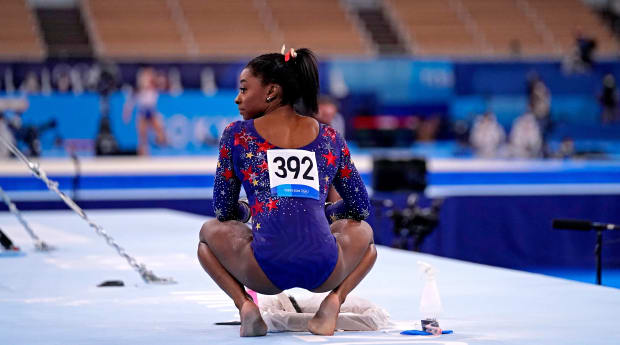The world's best gymnast has endured plenty over the course of her decorated career, but after her withdrawal, her Olympics still remain in doubt.
Sign up for our free daily Olympics newsletter:
Very Olympic Today. You'll catch up on the top stories, smaller events, things you may have missed while you were sleeping and links to the best writing from SI’s reporters on the ground in Tokyo.TOKYO — As she sailed through the Ariake Gymnastics Center on Tuesday night, Simone Biles realized she had lost herself. “I had no idea where I was in the air,” she said afterward. Her face crumpled as she trudged from the vault back toward the bench. She conferred with a team doctor, then withdrew from the team final. A few minutes later, as she went to look for her teammates, she seemed to find herself again.
Only Biles—and perhaps not even Biles, at this stage—knows what will come next for her. She said that she would take the rest of the Games “one day at a time.” But she did not seem like a person who was raring to get back in the gym, tweak her mechanics and charge back onto the podium. She has already withdrawn from the individual all-around competition, scheduled for Thursday night in Japan. Event finals begin on Sunday night. It’s hard to picture her competing in them. This is what she has to overcome: She is the greatest of all time, but she has never had a positive experience at the Olympics.
Somewhere between telling her crying teammates she was done and beaming as she accepted the silver medal they won without her, Biles relaxed. She pulled on her white sweatsuit, rolled down the waistband of the pants—she’s 4’ 8”—and threw herself into her role as head cheerleader.

At first, she winced at each release of the bars. Her face contorted as she screamed, “Come on!” She stood alone as the athletes waited for scores to come in. But by the time her teammates began their balance beam routines, she wore the biggest grin of all. She looked more comfortable on the sidelines than she did on any apparatus this week. She performed Jordan Chiles’s beam routine alongside her, hitting every landing. They both danced along to “Shape of You” over the public-address system as they waited for Chiles’s scores. When the result was official—Russia first, the U.S. second, Great Britain third—Biles was the first across the floor to congratulate the winners.
Afterward, speaking with the media, again and again she praised her teammates. “They get a gold medal from me in fighting because they never gave up, and they just showed the world what they're capable of,” she said. She giggled and teased them, joking when someone asked Chiles about filling Biles’s shoes, “They’re probably too small for her, actually.” She laughed off questions about the decision she made to simplify her vault: “Girl, I did not choose to do a one and a half [twist]!”
She seemed tired. She seemed giddy. She seemed relaxed. She did not seem regretful.
If anyone can return next week, it would be Biles. She has endured plenty. In 2018, she won the national championship with broken toes on both feet. Two months later, she won the world championship with a kidney stone. She has now won 31 world championship and Olympic medals, all against the backdrop of serial sexual abuse by team doctor Larry Nassar.
But all that has come at a cost. She often feels that she carries what she called “the weight of the world” on her shoulders. “S---’s heavy,” she said on Tuesday.

At the 2016 Olympics, she won four gold medals and one bronze. She did not enjoy the experience, she told SI in April, because she felt she was doing it for everyone else. “Everybody had such high expectations for me that at the end of the day, I feel like it didn’t matter what I did, as long as I satisfied everybody around me,” she said.
When the 2020 Games were postponed, she considered retiring. She was not sure she could weather another year of punishment to her body, another year of representing the organization that had allowed Nassar to prey on her and her peers.
She spent the extra year learning about herself outside the gym and remembering why she loved being inside the gym. She decided she would make these Olympics about herself.
Then she got to Tokyo. “I just don’t trust myself as much as I used to,” she said on Tuesday. “I don’t know if it’s age, but I'm a little bit more nervous when I do gymnastics. I feel like I'm also not having as much fun, and I know that”—she began to cry—"this Olympic Games I wanted to do it for myself, and I was still doing it for other people, so that just hurts my heart badly, that doing what I love has been taken away.”
It seems as if she has decided that doing it for herself means not doing it at all.
More Olympics Coverage:
• The USWNT's Off-Brand Olympics
• Sue Bird Seeks Historic Fifth Olympic Gold Medal in Tokyo
• Fencing’s Rich History With the Grisly—But Dignified!—Art of Dueling
• Biles, Osaka Signal New Era of Prioritizing Mental Health

Post a Comment
Thanks For Comment We Will Get You Back Soon.